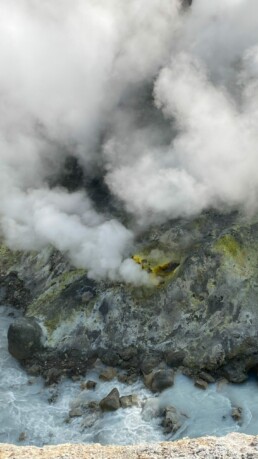What is sulphur a.k.a. sulphites a.k.a. SO2 a.k.a. E220 a.k.a. sulphur dioxide… oh, enough already!
Sulphur dioxide is a colourless gas, with a penetrating smell in its natural form, and discreet when dissolved in a liquid. All fermented products contain sulphur dioxide, coming from the natural process of fermentation. In other words, sulphites are a preservative naturally present in fermented products.
Are you following?
For wine, we use the term sulphites. Even in unsulphured wines, you can have up to 20 milligrams per litre (20gr/L), because sulphites are naturally produced by yeast during the winemaking process. This is why wine with “zero sulphites” doesn’t exist and why we use the term “no added sulphites”.
In the winemaking process, sulphur has been used since the 18th century. The Dutch introduced it in France with the invention of the sulphur fuse (which is used to disinfect the barrels before they are reused). Sulphur has antiseptic and antifungal properties, which inhibits yeast and harmful bacteria, and stabilises the wine. This sulphur is just like anything else: fine in the right amount, bad in excess (like the sun, water, oxygen, chocolate… OK, not chocolate.). It is all about balance.
The WHO has established the maximum daily intake of sulphur as 45 milligrams for someone weighing 65KG (10st 2lbs) ; with the rule of three you’ll see what’s right for you.
Here’s an informational table on the doses of sulphur authorised depending on the type of winemaking operation:

*AVN: Association des Vins Naturels (natural wines association)
Sulphur is a vast subject; industrial companies in the agrobusiness even add it to fruit (!) and chips (!), in addition to lots of additives and correctives. We are opposed to that. We are artisans, crafters, artists of winemaking, our philosophy can be summed up in one word: respect.
Making natural wine
Natural wines are not only about suphites, it is about how the vineyards are conducted (with plant maceration and “bouillie bordelaise” or with herbicide, pesticide and unatural fertilizers), how the grapes are handled (manually with care, or industrially with machines), how the juice is fermented (naturally or with the help of chemicals)… More is explained on our blog.
Caaaaaaat wines are naturally crafted by Christophe Kaczmarek in collaboration with his friends winegrowers which vineyards are cultivated according to the organic and biodynamic rules. The winemaking is then natural: no added products or chemicals, most of the time not even sulphites, and no filtration, fining or elements which could spoil the wines authenticity.
In all cases, taste is our number one priority.


